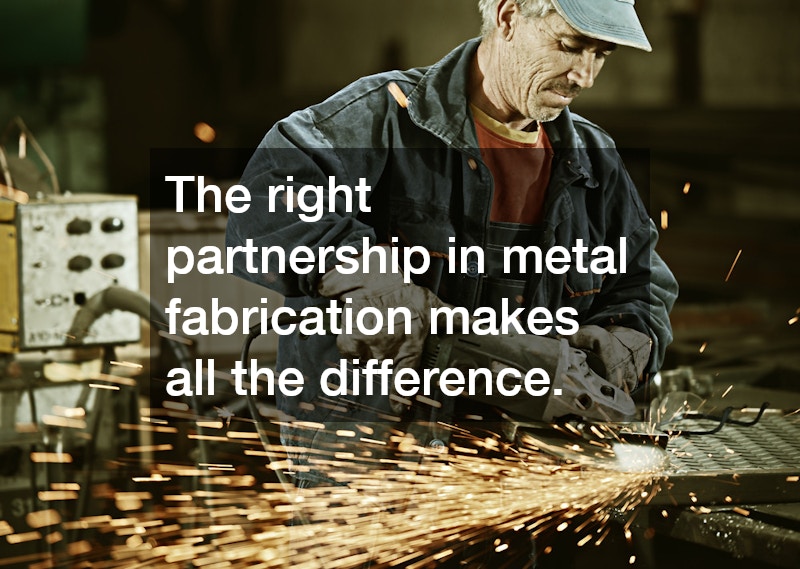
Choosing the right metal fabrication company is a decision that can significantly impact the outcome of your project. Whether you are planning a one-off build or need ongoing production support, the company you choose plays a key role in ensuring the work is completed on time, within budget and to a high standard.
From material selection to technical capabilities and turnaround times, there are many things to consider when evaluating your options.
Metal fabrication is a specialised field that requires not just the right tools and equipment, but also experience, expertise and a commitment to quality. If you rush the selection process, you might find yourself dealing with delays, miscommunication or poor workmanship. By knowing what to look for and asking the right questions early on, you can avoid these issues and find a reliable partner for your project.
Start With Your Project Requirements
Before contacting fabrication companies, it helps to be clear on your project requirements. Think about the scale, timeline and complexity of the job. Are you working with steel, aluminium or another material? Do you need precision cutting, welding or surface finishing? Having a detailed scope helps ensure that the companies you speak with understand what is involved and whether they are equipped to deliver.
It also helps to consider whether this is a one-time job or the beginning of a longer partnership. Some companies are better suited to high-volume production, while others focus on custom or small-batch work. Understanding where your project sits on that scale can save you time during the selection process.
Assess Experience and Technical Capability
Experience matters in metal fabrication, especially when the work involves complex designs or tight tolerances. Look for companies that have worked on similar projects or have relevant industry experience. Many fabricators will showcase their previous work online or be willing to discuss past jobs during a consultation.
It’s also important to check what equipment and technologies the company uses. Modern metal fabrication often involves CNC machines, laser cutters and other advanced tools that improve precision and efficiency. A fabricator with up-to-date equipment is more likely to deliver consistent, high-quality results.
Certifications and compliance with Australian standards are another key factor. Make sure the company adheres to relevant safety and quality regulations. This not only protects your project but also ensures the work will meet required specifications if it’s subject to inspection or approval.
Communication and Customer Service
Clear and honest communication can make or break a project. When speaking to potential fabricators, pay attention to how well they listen to your needs and how clearly they explain their process. Do they provide realistic timelines? Are they upfront about pricing and potential challenges?
Good customer service doesn’t just mean being polite. It means being responsive, dependable and willing to answer questions as they arise. A company that takes the time to understand your project from the beginning is more likely to deliver what you need, without surprises or setbacks.
Understanding Cost and Value
Metal fabrication is not an area where cutting costs always pays off. While price is an important factor, the cheapest quote isn’t always the best option. Instead, focus on value—what you get for what you pay. A company offering a slightly higher quote might provide better materials, faster turnaround or greater attention to detail.
Ask for itemised quotes so you can see exactly what is included. This helps prevent hidden costs later and allows you to compare bids fairly. Be cautious of quotes that seem too low, as they may indicate shortcuts in materials or workmanship.
Long-term savings often come from quality work that doesn’t need to be redone or repaired. Choosing a reputable company may cost more upfront, but it can save time, money and stress down the line.
Reliability and Turnaround Times
Meeting deadlines is often critical, especially if your fabrication project is part of a larger build or production schedule. Ask about typical lead times and what steps the company takes to stay on track. Delays in fabrication can quickly lead to setbacks in other areas, so reliability should be a top priority.
A good metal fabrication company will be honest about their current capacity and whether they can deliver your project within your desired timeframe. They should also be willing to provide updates along the way and notify you of any issues that arise.
The Importance of Quality Control
Quality control is one of the most important factors in any fabrication job. Poor welds, imprecise cuts or inaccurate measurements can compromise the final product and may even pose safety risks. Ask about the company’s quality assurance processes and how they check their work before delivery.
In many cases, it’s worth requesting a site visit to see the workshop and meet the team. Seeing the environment in which your project will be produced can provide added confidence and help establish a stronger working relationship.
Making the Right Choice
Choosing a metal fabrication company is more than just comparing prices. It’s about finding a team with the skills, equipment and dedication needed to bring your vision to life. Take your time to research, ask questions and review each option carefully. By focusing on experience, communication, value and quality, you can make a well-informed decision that supports the success of your project.
The right partnership in metal fabrication makes all the difference. Whether you’re building something from scratch or upgrading existing infrastructure, working with a reliable fabricator ensures the job is done right the first time.


